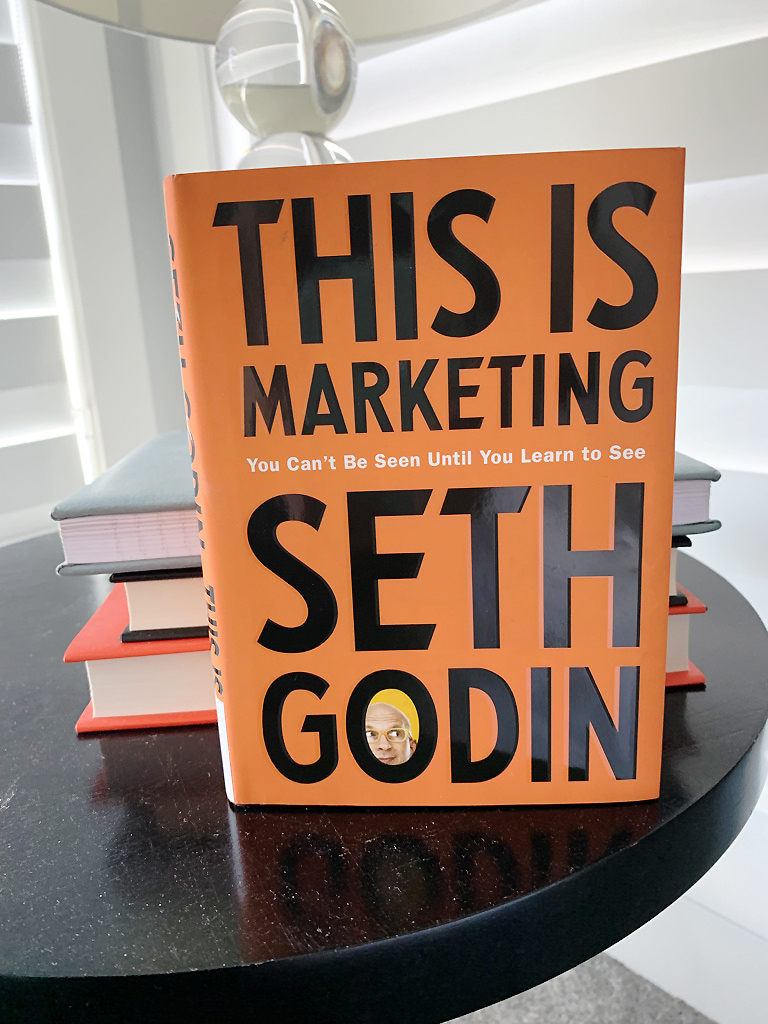
I think the best way to describe Seth Godin’s 2018 book This is Marketing is to begin by explaining what it is not.
Godin’s book is not an overview of marketing principles. It’s not an academic exploration of leading research. It’s definitely not for someone who is seeking tactical advice on how to tweak a campaign, to improve sales techniques or launch a product line.
It’s a sermon to the faithful.
Godin is a member of the AMA Marketing Hall of Fame, founder of altMBA, as well as the author of 18 best-selling books on marketing, including All Marketers are Liars and Purple Cow: Transform Your Business by Being Remarkable. If you are looking to renew your faith in the purpose of marketing, this book is meant for you.
A Wall Street Journal and New York Times Bestseller, This Is Marketing is a collection of thoughts on topics that Godin knows almost everything about. Like any good preacher, he speaks in parables. The chapters are short. He writes in soundbites.
I read a printed hardcover, but I can see how the material would resonate as an audio book or a TED talk. Almost without fail, his advice is steeped in positivity and relies on adopting a can-do attitude. That said, I’m not sure that he would convince readers of anything they didn’t already believe. The goal of the book is not to persuade; it’s to affirm.
Marketing is Everywhere
Is easy to see why Godin has built such a following over the course of his career. The strongest parts of This Is Marketing are when he talks about how pervasive and powerful marketing is. When we ask for a raise or appear before city council to seek a bylaw amendment, he points out that even these are marketing activities.
He argues that marketing can have real purpose and that a good idea can change the world. I was moved by his point that true success in this field is to meet the needs of your customer and to have pride in the marketing you do to meet those needs.
The Key Message
Godin’s message boils down to three sentences:
Know yourself.
Know your product.
Know your customer.
On the surface, these are self-evident statements. However, once you strip away your biases, expectations, aspirations and assumptions, they lead to deep, layered questions. His brevity and use of plain language conceal the fact that many of the concepts he talks about are complex and challenging to implement.
Strategic Marketing Questions to Ask Yourself
In a sly way, Godin offers guidance on how to know yourself, your product and your customer better by providing a simple marketing worksheet. Although he has written it with a marketer in mind, this series of questions would be useful to develop any communications, public relations or advocacy message:
- Who’s it for?
- What’s it for?
- What is the worldview of the audience you’re seeking to reach?
- What are they afraid of?
- What story will you tell? Is it true?
- What change are you seeking to make?
- How will it change their status?
- How will you reach the early adopters and neophiliacs?
- Why will they tell their friends?
- What will they tell their friends?
- Where’s the network effect that will propel this forward?
- What asset are you building?
- Are you proud of it?
This worksheet is printed at the back of the book but in my opinion, Godin should have led with it as it is a helpful primer to guide the reader though his thought process. It’s an excellent set of questions and in answering them, your company can go a long way to develop or refine its overall marketing strategy.
Those who are fans of this book describe it as a succinct philosophy of marketing – a cheesecake book that is best experienced one bite at a time, slowly, in order to savour it. This may be the intent, but it is brief to a fault.
At the expense of being pithy, Godin blazes through meaningful topics too quickly. For example, he underscores the importance of an organization’s culture early in the book. If you want to promote real change, then you should start with changing your culture. This is a profound and potentially catalytic concept that Godin introduces briefly on p. 13. And then, he moves on and says nothing more about it.
Focusing on the Smallest Viable Market
Godin also has some very sharp insights into the importance of winning the smallest viable market, a tribe whose specific needs are met by what your product offers. Too many companies, he argues, focus on a mass-market strategy without understanding that the path to success is grabbing hold of a group of people who understand your company and your product on a core level.
To clarify, he says it’s not about pushing a message; it’s about understanding a worldview. There is wisdom in understanding that while your product may not be for everybody, there are people out there for whom your product will be everything. Focus on that. Understand that.
Meeting the needs of your tribe – your smallest viable market – may be the critical path for you. This is a big idea, especially in a culture where success is traditionally defined as obtaining mass-market appeal. Marketers, he argues, are gardeners. They sow seeds so that sprouts can grow.
In this book, Godin is sowing seeds by sharing kernels of knowledge he has come to know after a long and highly successful career in marketing. Depending on whether you identify as part of Godin’s tribe and already share his worldview, some of his ideas will take root. Too many, I fear, will scatter to the wind.

